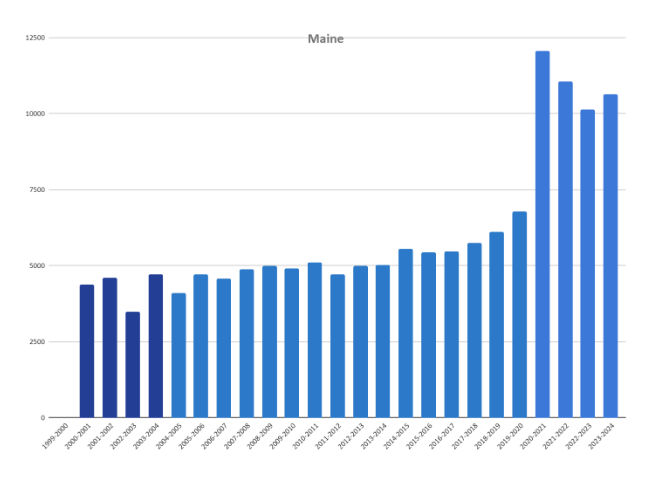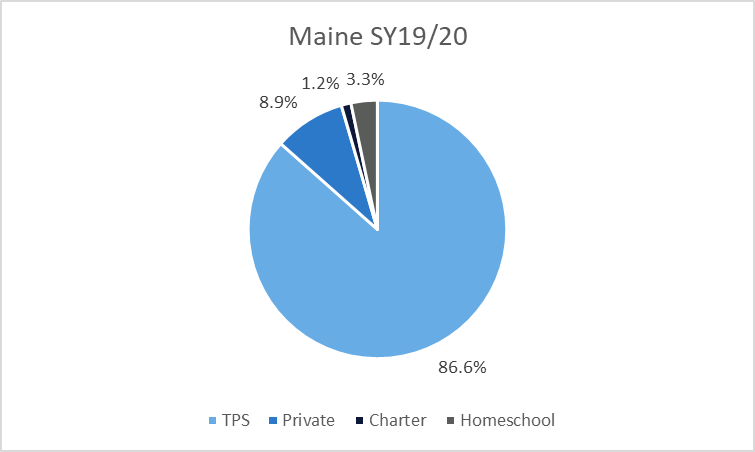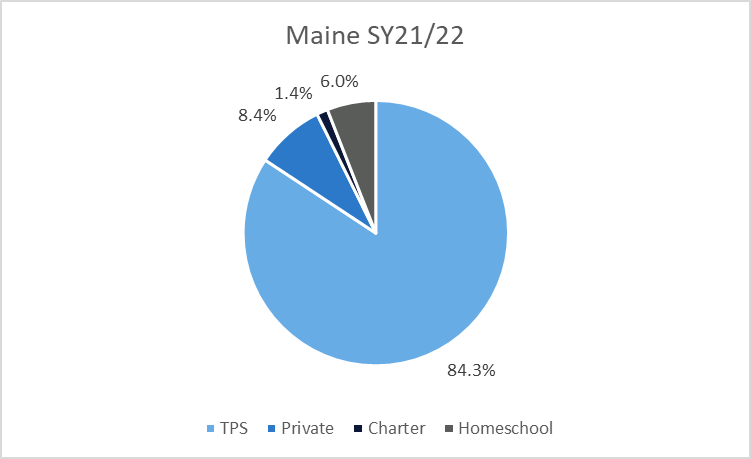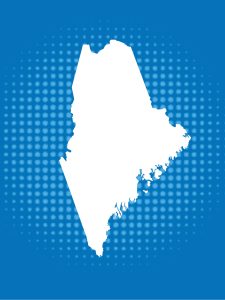Maine offers broad access for homeschooled students to offerings like courses and sports at their local public schools. This access includes services for students with special needs.
History
Located in the northeastern United States, Maine legalized homeschooling in 1983 but required approval from the state. The state expanded homeschool options in 1988 following a legal case filed against Maine’s Department of Education by homeschool parents (Blount vs. Maine).
Regulation
Maine provides two options for homeschooling students – under the home instruction option or as a private school. In Maine, parents who homeschool their children, from ages 6 to 17, must notify their local district of their intent to homeschool. There is no specific educational background requirement for parents. However, parents must keep records related to each child’s education. Families are required to show their child’s academic progress. Homeschooled students must learn all core subjects and attend at least 175 days of instruction. Local schools may provide textbooks if available. Homeschooled students in Maine must participate in an annual academic assessment, which may include a portfolio review by a Maine-certified teacher. The state will not provide any diplomas. Maine also provides parents with a list of homeschooling recommendations.
Nonpublic students, including homeschoolers, can access public school offerings (see Title 20-A), such as courses (some limits for private school students), extracurricular activities, and sports. This access is protected by statute, has few limitations, and is publicly funded.
Homeschooled students with special needs who choose to participate in classes at their local public schools are eligible to receive special education and related services. See Section IV.4.H on the Special Education Laws and Regulations page for more details.
State Data
In 2000, districts across the state reported nearly 4,400 homeschooled students, 5,000 students in 2015, and 6,700 in 2019. In 2021, reported homeschool enrollment reached 12,000 students. Maine showed nearly a 100% increase during the first year of the pandemic, followed by a 10% decrease in 2021-22.

U.S. Census estimates also provide some information on the percentage of families homeschooling around the pandemic. In the spring of 2020, 4.1% of families reported homeschooling, and 11.6% by the fall of 2020. This is comparable to the national average of 11.1% during this time. Based on U.S. Census data, our calculations indicate that about 5.15% of K-12 students in Maine were homeschooled during the 2022-23 school year, and 5.86% during the 2023-24 school year. Due to survey changes, the data from 2020 reflects the percentage of households, while the data from following years reflects the percentage of students.
Maine is one of a handful of states that provides publicly available disaggregated data. For example, participation counts by district indicate that a large area like Portland reported 72 homeschooled students in 2020, grew to 174 in 2021 and dropped to 134 in 2022. Smaller districts followed similar trends with examples like Saco, where 36 homeschooled students increased to 79 in 2021 and decreased to 65 in 2022. These data also provide information on the grades most populated by homeschooled students. For example, in 2022, there were just over 1,000 seven-year-old homeschooled students; 991 were eight years old, 980 were nine years old, and the numbers continue to decline as students age.
Cross-Sector Comparison
During the 2019-20 academic year, 3.3% of Maine’s K-12 students were homeschooled. Homeschool participation in the state was less than half of the 8.9% of students attending private schools. Charter school participation in Maine was even lower than homeschool participation, at only 1.2%. In 2021-22, 6.0% of Maine’s K-12 students were homeschooled. Homeschool participation in the state was lower than the 8.4% of private school students. Charter school participation in Maine was even lower than homeschool participation, at only 1.4%.


School Choice Context
Maine has restricted open enrollment (inter- and intra-district choice) in its public school system, and families can only send their children to schools outside of their geographic district with approval. Maine has a strict charter school cap, limiting charter school enrollment in the state, and allows some magnet schools. Maine does not have a voucher or educational savings account program, so parents who send their children to private schools are responsible for all costs. They have a town tuitioning program where students in districts without a district school can receive funding to attend a neighboring public school or a private school (although not a religious school) of their choice. However, these funds cannot be used for homeschooling.
Commentary
Maine publicly reports a wealth of data on their homeschooled population. The state also offers broad access to public school offerings. The town tuitioning program could potentially expand, opening up funding for homeschool families.

-
11.6% Families
Around 11.6% of families in Maine homeschooled during the height of the pandemic (Fall 2020).
-
1983 Legalized
Homeschooling was legalized in 1983 in the state of Maine.
-

-
More Information
11.6% Families
Around 11.6% of families in Maine homeschooled during the height of the pandemic (Fall 2020).
1983 Legalized
Homeschooling was legalized in 1983 in the state of Maine.

More Information
Last updated March 2025.